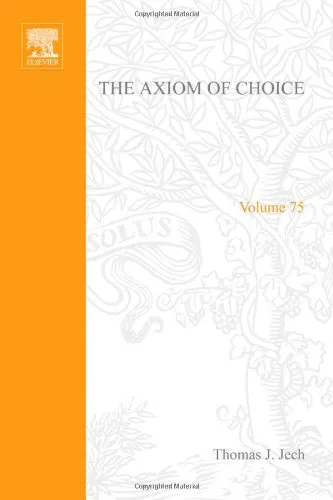The Axiom of Choice
4.8
Reviews from our users

You Can Ask your questions from this book's AI after Login
Each download or ask from book AI costs 2 points. To earn more free points, please visit the Points Guide Page and complete some valuable actions.Introduction to "The Axiom of Choice"
"The Axiom of Choice" is a comprehensive exploration of one of the most controversial and influential principles in mathematical logic and set theory. Written by T. J. Jech, this book provides a meticulous and rigorous examination of the Axiom of Choice (AC), which has ignited debates and curiosity among mathematicians, philosophers, and logicians alike. It serves as both an academic resource for advanced experts and an insightful guide for those venturing into areas where choice becomes a profound and nuanced concept.
The axiom itself, simply stated, posits that given a set of non-empty sets, it is possible to select exactly one element from each set simultaneously. Despite its apparent simplicity, this principle has far-reaching implications in mathematics and raises questions about constructivity, existence, and the foundational framework of set theory. "The Axiom of Choice" dives into these intricacies, presenting a structured and thought-provoking narrative that balances mathematical precision with conceptual clarity.
Detailed Summary of the Book
The book delves into the origins, definitions, and implications of the Axiom of Choice, breaking down its impact across various areas of mathematics.
Starting with the historical context, Jech traces how AC emerged as a response to specific problems in set theory and algebra. The text introduces key concepts, such as Zermelo's original formulation and the equivalence of AC to other mathematical propositions, including Zorn's Lemma and the Well-Ordering Theorem. The initial chapters provide insights into the axiom's controversial adoption into formal systems and its philosophical implications for mathematics and logic.
The book also explores uses of AC in analysis, topology, and group theory, illustrating its power and versatility. It carefully examines mathematical results that are dependent on AC and contrasts them with those that can be derived independently. Furthermore, the author addresses stronger and weaker variants of the axiom, as well as the significant consequences of denying AC, such as the emergence of non-measurable sets and paradoxical decompositions, including the famous Banach-Tarski paradox.
A prominent feature of the book is its nuanced treatment of models of set theory. With clarity, Jech introduces readers to the development of independence results, particularly those by Gödel and Cohen, and explains the construction of models where AC holds or fails. The text underscores the axiom's dual role as both an essential mathematical tool and a provocative element in philosophical discussions about infinity and constructivism.
Key Takeaways
- A thorough understanding of the origins, development, and core concepts of the Axiom of Choice.
- Insight into the implications of the axiom across mathematics, including its applications in areas like topology and group theory.
- Exploration of the relationship between the Axiom of Choice, Zorn's Lemma, and the Well-Ordering Theorem.
- An overview of independence proofs and models of set theory involving the presence or absence of AC.
- Philosophical perspectives on mathematics, constructivism, and the nature of mathematical existence.
Famous Quotes from the Book
"The Axiom of Choice is both the glue that holds the abstract structure of mathematics together and the spark that causes its foundations to tremble."
"To accept the Axiom of Choice is to accept that existence need not be witnessed but can be inferred from logical necessity."
Why This Book Matters
"The Axiom of Choice" is a cornerstone text for those seeking a deep and critical understanding of one of the most debated elements of mathematical logic.
By seamlessly combining mathematical rigor with philosophical inquiry, the book offers an unparalleled exploration of AC's foundational role in modern mathematics. For students and researchers in fields such as logic, set theory, and philosophy of mathematics, the book is an indispensable resource. Its treatment of independence proofs and logical models provides valuable insights for those grappling with the interplay of necessity and contingency in formal systems.
Furthermore, the book's exploration of paradoxes and non-intuitive outcomes of AC demonstrates both the power and the limits of mathematical reasoning. It invites readers to reflect on how we define "truth" and "existence" within mathematical discourse, making it a thought-provoking text for mathematicians, philosophers, and enthusiasts alike.
Free Direct Download
You Can Download this book after Login
Accessing books through legal platforms and public libraries not only supports the rights of authors and publishers but also contributes to the sustainability of reading culture. Before downloading, please take a moment to consider these options.
Find this book on other platforms:
WorldCat helps you find books in libraries worldwide.
See ratings, reviews, and discussions on Goodreads.
Find and buy rare or used books on AbeBooks.
1190
بازدید4.8
امتیاز50
نظر98%
رضایتReviews:
4.8
Based on 0 users review
"کیفیت چاپ عالی بود، خیلی راضیام"
Questions & Answers
Ask questions about this book or help others by answering
No questions yet. Be the first to ask!


